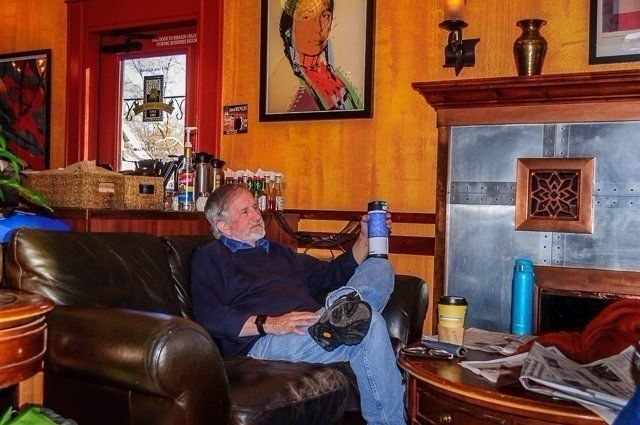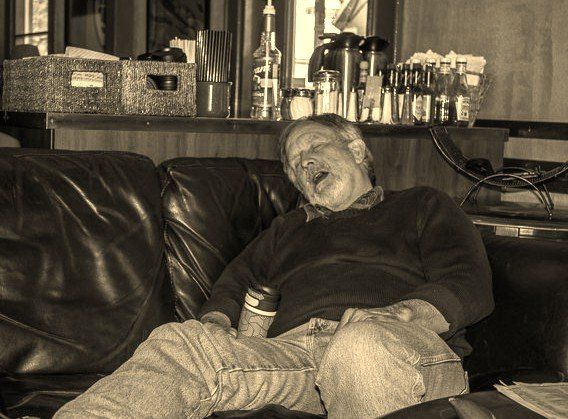Check Fuel, Long Bridge Ahead*
The tranquil drive from Panama City to Pensacola gave me time to reflect upon my hectic life. I seem to load myself up with interesting projects only to find myself immersed. Submersed may be a better description. So I missed half the beauty of the drive because I couldn’t get my mind outside itself. When I approached the Check Fuel, Long Bridge Ahead sign announcing the long concrete path into Pensacola, I wondered if I had enough fuel in my own tank for the personal trip before me.
Just the day before I sat in Andy’s Flour Power Bakery and Café in Panama City Beach, Florida, taking a break from the conference hotel where I was staying. Sometimes I just need to get away by myself. Somehow, the windows painted in blue and yellow (in vertical stripes similar to a U.S. flag, matching the design of the menus), the waitress who “honey-ied” me as she slopped a bit of decaf over my cup and onto the table, the coffee grinder grinding (along with Frank crooning “That’s Life” in the background), all added up to simple, almost palpable pleasure for me. Although I may not always have Paris (yet, anyway), I’ll always have Andy’s, it seems.
I like discovering a nifty little café quite as much as I like settling into an old-fashioned pub on a rainy, late afternoon. Each public inn has a distinctive personality. I revel in the folks who reside there, the décor, the “feel,” and the luxury of being in a social situation without the pressure of work goals. In winter, I particularly like those taverns with lots of wood furnishing, a fire place, and the anticipation of a quiet little spot that will crowd up later on with heaps of people of varying social and personal agenda.
In summer, nothing is better than sitting outside, on the cusp of expectations and possibilities. I get a little giddy when I know a folk group will be soon be playing music, for I love to dance, even in my chair. Really good establishments have something memorable about them. Kells Irish Restaurant & Pub in Portland comes to mind since the waitress there once took a dollar bill off me by swearing she could fling it against the ceiling and it would stick. It did. She did.
For special cafes, there’s the extravagant ability to sit for hours; spend little money; and observe everyone from boys and girls kissing, to retired bank presidents reading the morning paper, to leg-shaking entrepreneurs making cold calls over a cup of latte. These spots usually have interesting names like the Flying Star in Albuquerque, an old haunt of mine formerly named the Double Rainbow.
I remember studying for my comprehensive exams and then writing the dissertation for my doctorate mostly at the Double Rainbow. There I could see people, grab a cuppajoe, perhaps chat it up with the waiter, and then move back into a studious mode. Lots of folks can’t do that, and you know who you are. You simply must have a quiet room with no interruptions.
Not me, I like to hear rustling magazines, cups and silverware being gathered up, chairs scraping at the table across the room. (“My Way” wafted through Andy’s to my delight.). Sitting in Andy’s allowed my mind to come up for air, and to re-engage my senses in the moment rather than the past or future.
Neither my wife, my son, his wife, nor I could figure out how the waitress at Kell’s could get the dollar bill to stick to the ceiling. That little conundrum, however, wasn’t nearly as difficult to solve as the challenge of remembering to replenish my own reservoir of energy. Andy’s was a rest stop, a chance to top off the tank – literally and figuratively, and then I was back on the road.
What is your fuel? Is it the company of close friends and family? Is it work that inspires you? Is it delving deeply into your spiritual self, writing poetry, playing sports, or walking through woods? What part of you sustains you when the world around you is unsustainable?
The long bridge stretching out gave me pause, but only for a moment. I checked my fuel gauge and realized I had plenty. Then I luxuriated in a slow, peaceful drive through bluesy skies softly touching bluer waters. And my blues just, well, blew away.
*Lightly adapted from the original, which appeared in an E-newsletter I sent in March, 2008. Seemed like a good time for it again.












